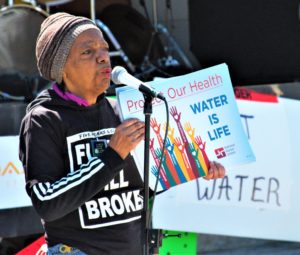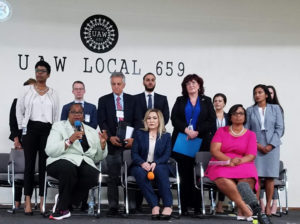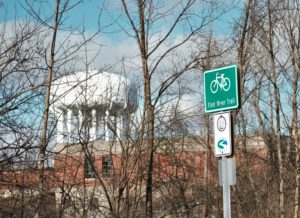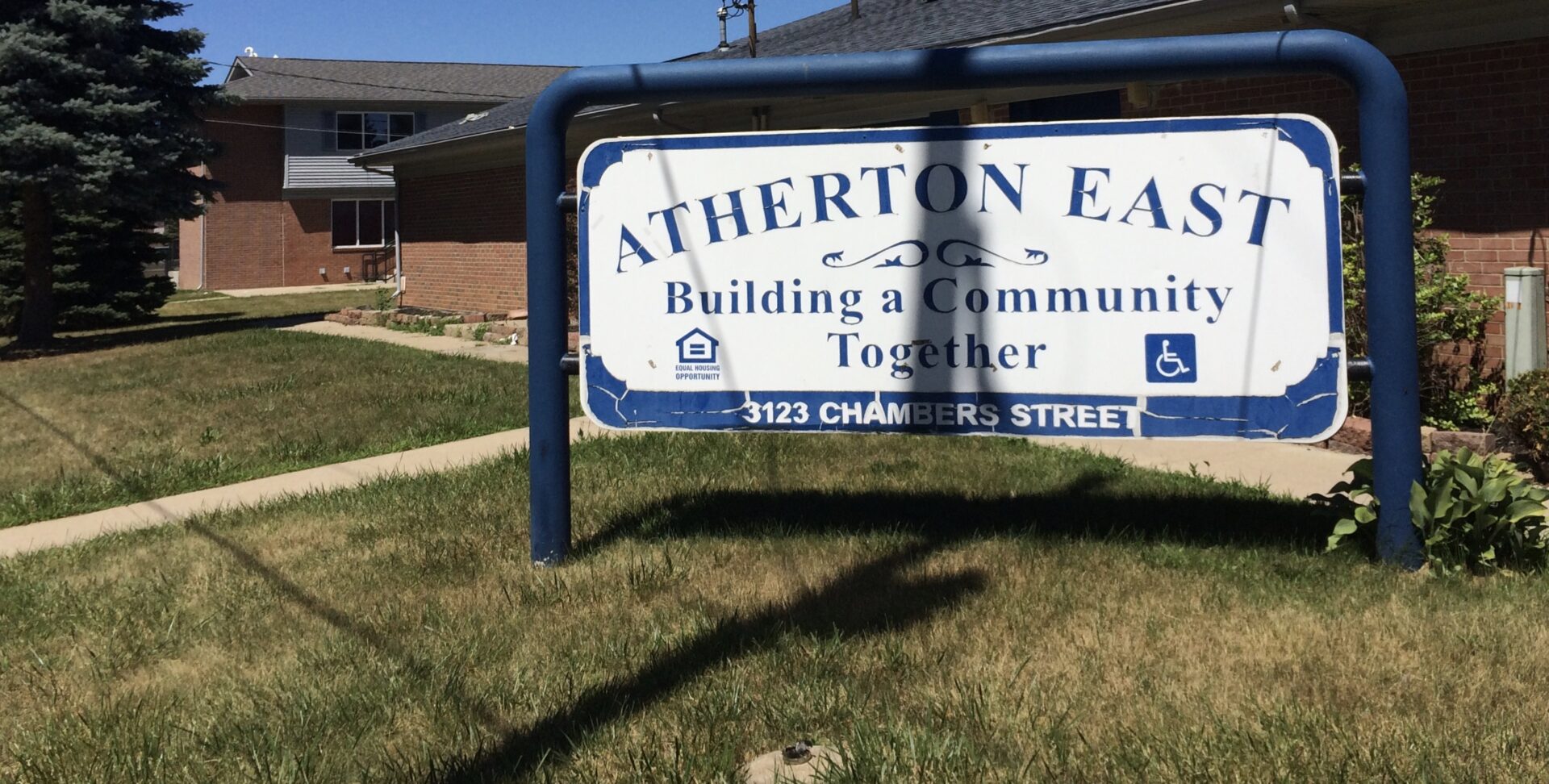By Tom Travis
“We have a reputation in Flint for social justice. The home of the Sit Down Strike, the first major city to institute open housing: We don’t tolerate injustice and inhumanity.”
So declared water warrior and local activist Claire McClinton to a fully masked crowd of about 50 on Sunday — some standing, some sitting in their cars — at the old Flint Farmers’ Market on E. Boulevard Drive.
They were gathered for a commemoration of the seventh anniversary of the Flint Water Crisis, a public health debacle triggered when the city’s water source changed from Detroit water to the Flint River.
Before and after the Sunday event, local jazz teacher and musician Pat Cronley set the stage with his four-member band playing jazz. Eric Mays, First Ward councilperson, sang with the band, in his strong deep voice, the African-American spiritual Wade in the Water.
The Flint Water Crisis began with a “flip of the switch” – April 25, 2014
April 25, 2014, was the date then-Mayor Dayne Walling flipped a switch at the Flint water plant, changing the city’s water source from Detroit Water to the Flint River. For the next 18 months, improperly treated water from the river flowed into the pipes of of residents, schools, restaurants and businesses in Flint. And thus The Flint water crisis began, eventually leading to lead exposure in the bodies of thousands of Flint children, a chain of disastrous health, psychological, sociological, economic and political effects.

Flint Water Warrior and local activist, Claire McClinton speaks at the 7th anniversary of the Flint Water Crisis Commemoration. (Photo by Tom Travis)
“We are not celebrating…” Bishop Jefferson
“We are not celebrating….seven years we’ve been in this crisis, seven years we’ve been fighting, seven years we’ve had to stand up and speak up,” Bishop Bernadel Jefferson pleaded into a microphone at the opening of the event.

Bishop Bernadel Jefferson opens the event in prayer. (Photo by Tom Travis)
Jefferson proclaimed, “We are still mindful of what’s going on in our city, we are mindful that we are still in this struggle, we are still mindful that we got a long ways to go, and if we don’t work on it we’ll never make it to the finish line.”
FAST Start pipe replacement began in March, 2016
Former Mayor Karen Weaver’s administration launched the FAST Start pipe replacement project in March 2016, funded by $100 million from the federal Water Infrastructure Improvement for the Nation (WIIN) Act. The project continued with Mayor Sheldon Neeley’s administration in the Fall of 2019. Then the project was waylaid by the worldwide coronavirus pandemic. The FAST Start project resumed in June 2020.
In an April 23, 2021 press release Mayor Sheldon Neeley announced that “as of April 9, 2021, there have been excavations of pipes at 26,819 homes and 9,941 lead and/or galvanized steel pipes have been replaced. The remaining used safe water pipe material and did not need to be replaced.
Photo source: EVM archives
There are an estimated 500 more homes awaiting excavation. Residents still can choose to opt-in to the service line replacement program. For more information, go to www.cityofflint.com/
gettheleadout.”
Prosecutions announced: “No velvet ropes in the criminal justice system.” Solicitor General Fadwa Hammoud
Prosecutions against eight, from high ranking government officials down to local officials were announced in early 2021.
Some of the hand made signs decorating the backdrop of the seventh anniversary of the Flint Water Crisis event. (Photo by Tom Travis)
Former Michigan Gov. Rick Snyder and eight other former state and local officials, including Nick Lyon, former director of the Michigan Department of Health and Human Service; Snyder’s “transformation manager” Rich Baird; and Dr. Eden Wells, the state’s former chief medical executive; faced charges connected to their alleged role in the Flint water crisis.

Solicitor General Fadwa Hammoud (seated center with orange mic) and Kym Worthy, Wayn County Prosecutor assigned as lead prosecution on Flint Water Crisis Settlmement (seated left speaking in mic) and a host of lawyers and State officials speak to beleagured Flint residents in 2019. (Photo by Tom Travis)
Two of those charged are former emergency managers for the city appointed by Snyder–Gerald Ambrose and Darnell Earley, as was Howard Croft, former director of public works for the City of Flint.
Coalition for a Fair Water Settlement calls on elected officials to make changes to $641 million Water Crisis Settlement
At Sunday’s anniversary event, local Harvard-trained epidemiologist and public health leader Jasmine Hall read a letter from the Coalition for a Fair Water Settlement. She said the letter has been sent to local, state and federal election officials who represent Flint.
The letter outlines two main concerns of the coalition, and calls on elected officials “to do even more.” The letter complains about inadequate access to neuropsychological assessment from “the Neurodevelopmental Center of Excellence (NCE) They assert that the NCE has the potential to be “an outstanding resource for Flint kids,” but that the settlement is being “unfairly used as a way to discriminate against kids who were harmed by the crisis but never assessed, or given proof.”
The group asserts that more tham 2800 children have been referred for further testing at the NCE but as of December 2020, only 28 children, fewer than one per cent, were actually evaluated. The other 99 per cent are left without assessment.
“Parents were repeatedly assured that the water was safe to drink, and specifically that claims of lead in water were unfounded. Some parents did not know they needed to get their children’s blood lead tested during the time when their child’s body had peak lead levels.”
And finally the letter states that “bone lead scans are tests that have not been made widely available to Flint residents, despite the Judge’s [U.S. Federal Judge Judith Levy] order to expand access beyond one class law firm. More importantly, these bone lead scan tests have not been approved for use in humans by the FDA [U.S. Food and Drug Administration].”
Flint water tower at the water plant on north Dort Hwy. (Photo by Tom Travis)
The three-page letter further raises concerns about adults in the settlement, stating, “Adults have not been properly informed about the settlement process or the registration deadline of March 29.” The letter names three additional barriers.
Medical proof: Adults are required to provide proof that the water crisis caused or exacerbated their medical concerns–proof that the medical community was and is still reluctant to give. Without proof of lead levels or medical documentation of physical injury, residents are compensated under “Category 28: Property Damage” splitting no more than $1000 per household, less than what was paid in initial water bills for water that the defendants poisoned Flint with.
Flint Water Crisis activists wearing shirts with “Flint is Still Broken” written on them at a June 2019 meeting at UAW local 659. (Photo by Tom Travis)
Too narrow in scope: There was more than lead in Flint’s water. It is public knowledge that there were other bacteria, and chemicals such as PFAS [PFAS have been manufactured and used in a variety of industries around the globe, including in the United States since the 1940s.] and TTHM [TTHM” is “total trihalomethanes,” a group of chemical compounds first identified in drinking water in the 1970’s that form during drinking water treatment. The compounds are produced when organic matter in natural water reacts chemically with chlorine disinfectants, and are just one type of a larger family of chemicals known as Disinfection Byproducts.] in Flint water. It is believed that the increase in kidney disease and certain types of auto-immune cancer can be attributed to the water crisis. Every individual, not only households who were exposed to the water, should receive health care and thousands of dollars in compensation because officials exposed Flint to poison and manufactured another layer of trauma.
Flint Resident, Vicki Marx, had her car decorated with signs. (Photo by Tom Travis)
Medical coverage: After being exposed for 18 months to racialized trauma and contaminated Flint water, every adult and child resident who was exposed should receive medical coverage without income restrictions–Medicare for All for life. Whether this comes through this settlement or through ACA legislation this healthcare package should be of utmost priority to those representing this community.”
The letter ends by calling on elected officials to issue a public statement, in their official capacity, amplifying the settlement concerns raised in the letter, demanding a second “registration, objection, and opt-out period” for the settlement and pushing for legislation that provides Flint Medicare for all for life, covering all children and adults exposed to contaminated Flint water. Health care is a critical piece that the proposed settlement fails to address.

1st Ward Councilperson Eric Mays bowing on his knees and folding his hands in prayer during the Flint Water Crisis seventh anniversary commemoration event. (Photo by Tom Travis)
The letter is signed: Jasmine Hall, public health leader and epidemiologist; Judy Alexander, Flint resident; Councilman Eric Mays; Clair McClinton, Democracy Defense League; Imari Smith, Flint resident; Pastor McClane, Greater Destiny Ministries; Former Mayor Dr. Karen Weaver; E. Yvonne Lewis, National Center for African American Health Consciousness and Nayyirah Shariff, Flint Rising and additional support from Black Millennials 4 Flint (BM4F), Michigan Poor People’s Campaign and Neighborhoods with Borders.
“There’s something missing here” – Pastor and water warrior activist Monica Villarreal
Noting the greater need for policy changes for improved water health and water laws. Flint pastor and water warrior Monica Villarreal said, “There’s something missing here.”
She said she fears that with the change in federal level administrations (from Trump to Biden) that the various federal (Trump to Biden) and state (Snyder to Whitmer) departments are not being encouraged to continue to communicate with Flint leaders and activists.
Neither Mayor Neeley nor state or federal legislators were seen at the seventh anniversary event on Sunday. Two Flint City Councilpersons were present, Eric Mays (1st Ward) and Jerri Winfrey-Carter (5th Ward).

Water warrior and activist, Pastor Monica Villarreal bows her head in prayer with the crowd at Sunday’s 7th Flint Water Crisis anniversary event. (Photo by Tom Travis)
Villarreal said what she has learned through the last seven years is the strength of the community by coming together, forging new relationships beyond racial barriers. She noted the water crisis has been a “people crisis” and “we have all had to come together across racial divides.”
EVM Managing Editor, Tom Travis, can be reached at tomntravis@gmail.com












You must be logged in to post a comment.